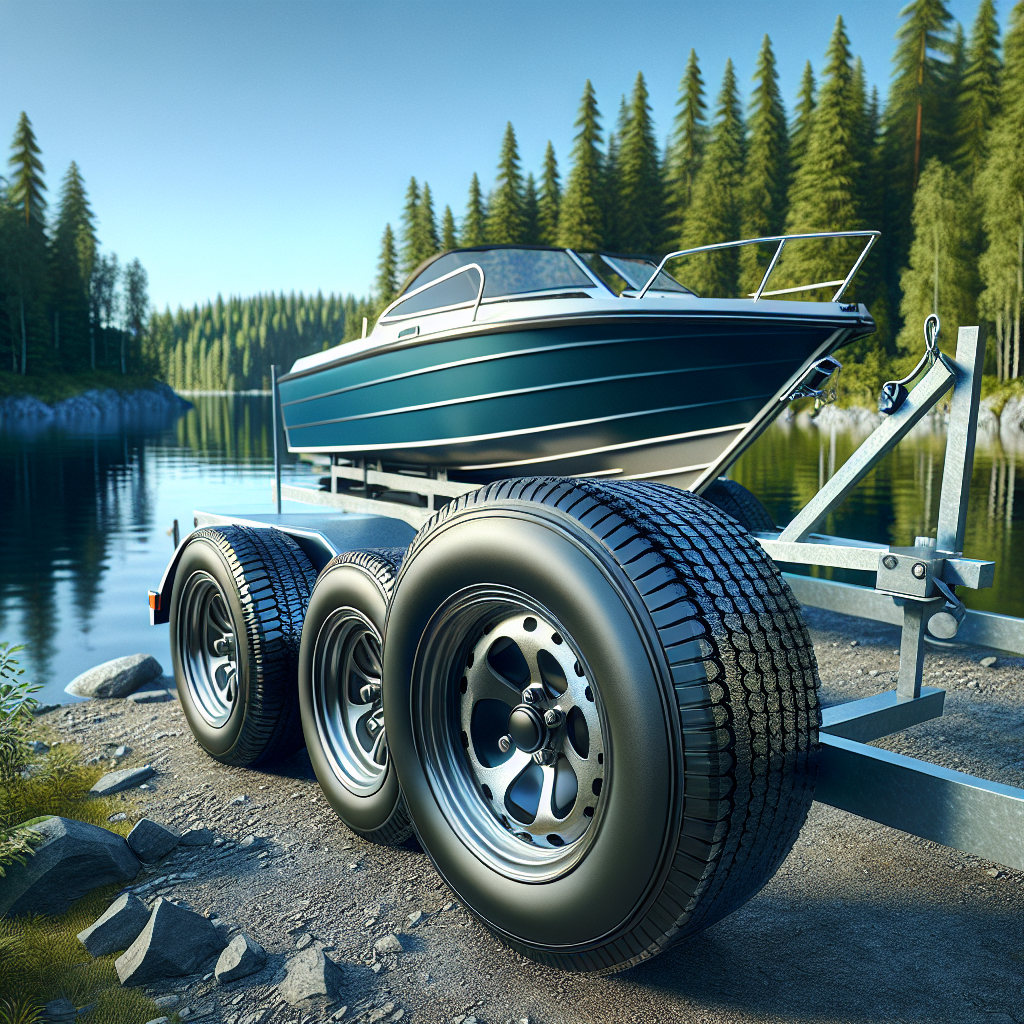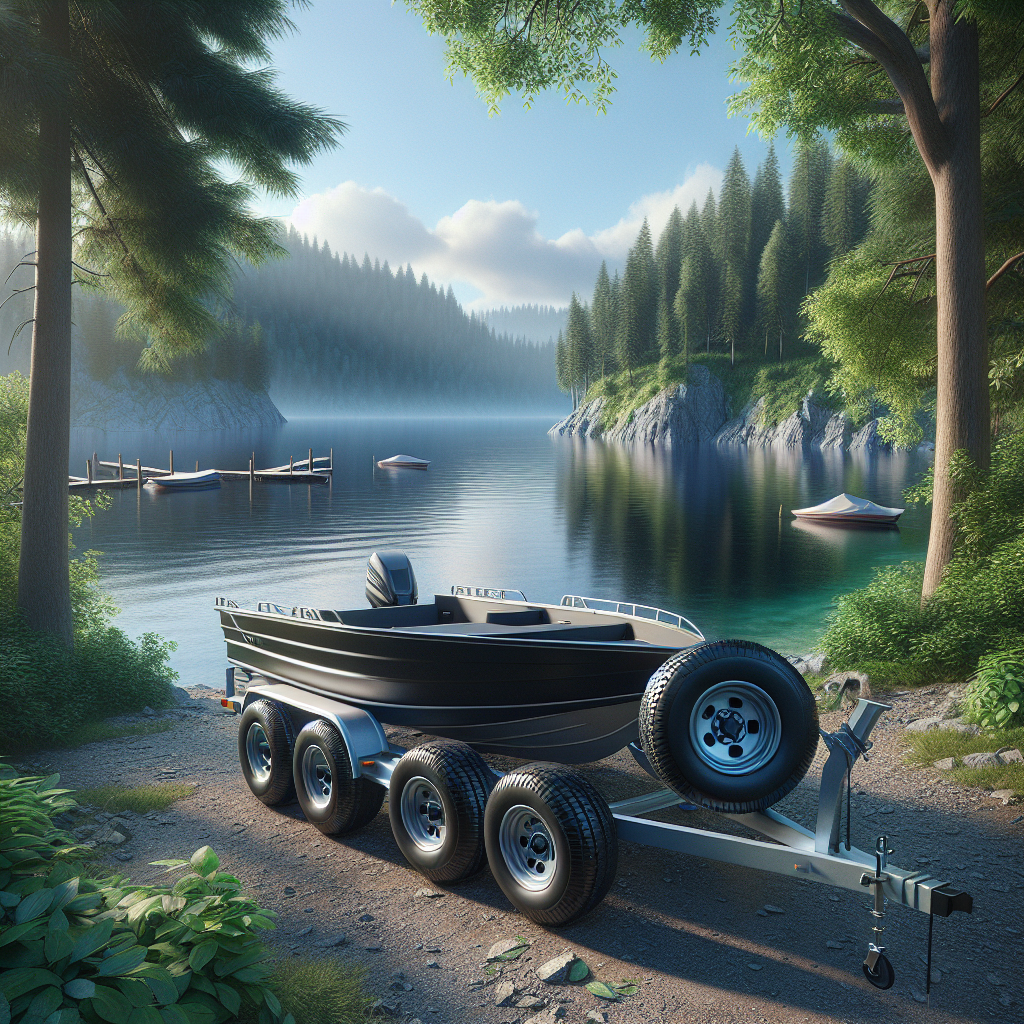Maintaining the right tire pressure on your boat trailer is not just a matter of convenience; it is a critical aspect of safety and performance. When embarking on a journey, especially with a heavy load like a boat, ensuring that your tires are properly inflated can significantly impact your overall experience.
Under-inflated tires can lead to various issues, including:
- Increased Wear and Tear: Tires that are not inflated to the correct pressure wear unevenly, leading to a shorter lifespan.
- Poor Fuel Efficiency: Incorrect tire pressure can increase rolling resistance, resulting in higher fuel consumption.
- Reduced Handling and Stability: Proper tire pressure is essential for optimal handling, especially when towing a heavy trailer.
- Risk of Blowouts: Low tire pressure can cause tires to overheat and potentially blow out, posing serious safety risks on the road.
To avoid these problems, implementing a reliable boat trailer tire pressure monitoring system is essential. Such a system continuously tracks tire pressure, alerting you immediately to any discrepancies. This not only enhances safety but also ensures that your trailer performs at its best.
Don’t compromise on safety! Tow with peace of mind, knowing that trailerwatchdog is standing guard.
Benefits of a Boat Trailer Tire Pressure Monitoring System
Investing in a boat trailer tire pressure monitoring system offers numerous advantages that can enhance both your safety and driving experience. Let's explore some of the key benefits:
- Real-Time Monitoring: With a tire pressure monitoring system, you receive real-time data about your tire pressure, allowing you to make informed decisions while on the road.
- Early Warning Alerts: Many systems provide advance alerts for low or high tire pressure, enabling you to address issues before they escalate into serious problems.
- Improved Safety: By ensuring that your tires are always at the correct pressure, you reduce the risk of blowouts and accidents, making your journeys safer for both you and other road users.
- Enhanced Fuel Efficiency: Properly inflated tires contribute to better fuel efficiency, saving you money on fuel costs during your travels.
- Extended Tire Life: Consistent monitoring helps you maintain optimal tire conditions, which can prolong the lifespan of your tires and reduce replacement costs.
In today's fast-paced world, having a dedicated tire pressure monitoring system for your boat trailer not only enhances safety but also ensures that you can enjoy your trips with confidence and peace of mind.
How to Choose the Right Tire Pressure Monitoring System

Choosing the right boat trailer tire pressure monitoring system can greatly impact your overall towing experience. With numerous options available on the market, it's essential to consider several factors to ensure you select the best system for your needs:
- Compatibility: Ensure that the system is compatible with your specific trailer type and tire sizes. Some systems are designed for particular models or types of trailers, so verifying compatibility is crucial.
- Sensor Type: There are two main types of sensors: direct and indirect. Direct sensors measure tire pressure at the valve stem and provide accurate readings, while indirect systems estimate pressure based on wheel rotation. Choose a type that meets your accuracy and convenience needs.
- Display Options: Consider how you want to receive tire pressure notifications. Some systems come with dedicated displays, while others send alerts to your smartphone or GPS device. Choose a display option that suits your preferences for ease of use.
- Range and Battery Life: Look for systems with a sufficient range to cover your towing distance. Additionally, consider battery life; systems with longer-lasting batteries reduce the hassle of frequent replacements.
- Price and Warranty: Compare prices while considering the features offered. A slightly higher investment may yield better quality and durability. Additionally, check for warranty options, as a good warranty can provide peace of mind about your purchase.
By taking these factors into account, you can confidently select a tire pressure monitoring system that enhances your trailer safety and performance.
Steps to Install Your Tire Pressure Monitoring System

Installing a boat trailer tire pressure monitoring system is a straightforward process that can significantly enhance your towing safety. Follow these steps to ensure a successful installation:
- Gather Your Tools: Before starting, make sure you have all the necessary tools on hand. This may include a wrench, screwdriver, and any specific tools recommended by the manufacturer.
- Read the Instructions: Each monitoring system comes with its own set of installation instructions. Carefully read through the manual to understand the specific installation steps and requirements for your chosen system.
- Locate the Valve Stems: Start by locating the valve stems on your trailer's tires. These are typically at the top of the tire and are where you will attach the pressure sensors.
- Install the Sensors: If you’re using direct sensors, remove the existing valve stem caps and replace them with the sensors according to the manufacturer's instructions. Ensure they are tightened securely to prevent leaks.
- Connect the Display Unit: Set up the display unit in a location that is easily visible while towing. Follow the provided instructions to connect it to the sensors. This may involve pairing the devices via Bluetooth or simply plugging the display into a power source.
- Power Up and Test: Turn on the system and check that all sensors are communicating with the display unit. Ensure that you receive accurate pressure readings for each tire. If you encounter any issues, consult the troubleshooting section of the manual.
- Final Checks: Once everything is installed and functioning correctly, perform a final check to ensure that all components are secure and that the system is operating as intended.
By following these steps, you can easily install your tire pressure monitoring system and gain peace of mind while towing.
Tips for Maintaining Optimal Tire Pressure

To ensure the longevity and performance of your boat trailer tires, maintaining optimal tire pressure is essential. Here are some valuable tips to help you keep your tires in peak condition:
- Check Tire Pressure Regularly: Make it a habit to check your tire pressure at least once a month and before any long trips. Tire pressure can fluctuate due to temperature changes and other factors.
- Use a Reliable Gauge: Invest in a quality tire pressure gauge to get accurate readings. Digital gauges tend to provide more precise measurements compared to manual ones.
- Monitor Temperature: Keep an eye on the temperature, as tire pressure can drop in colder weather or increase in hot conditions. Adjust accordingly to maintain optimal pressure.
- Follow Manufacturer Recommendations: Always refer to your trailer and tire manufacturer’s guidelines for the recommended tire pressure. This information is typically found on a sticker located on the trailer or in the owner’s manual.
- Inspect Tires for Damage: Regularly inspect your tires for signs of wear, cracks, or bulges. Damaged tires can lead to improper pressure readings and increase the risk of blowouts.
- Rotate Tires: Just like with vehicle tires, rotating your trailer tires can help distribute wear evenly and maintain proper pressure across all tires.
- Don’t Overload Your Trailer: Ensure that you’re adhering to weight limits. Overloading can lead to increased tire pressure and premature wear.
By implementing these tips, you can maintain optimal tire pressure, ensuring your boat trailer remains safe and efficient on the road.
Conclusion: Enhance Your Trailer Safety and Performance

Enhancing your trailer's safety and performance is not just about regular inspections and maintenance; it's about leveraging technology to stay ahead of potential issues. A boat trailer tire pressure monitoring system can significantly reduce the risk of tire-related failures while you’re on the road. By providing real-time data on tire pressure and axle temperatures, these systems empower you to make informed decisions, ensuring that your trailer operates smoothly and safely.
Utilizing a monitoring system allows you to:
- Prevent Catastrophic Failures: Early detection of tire pressure issues can help you avoid blowouts and accidents.
- Enhance Fuel Efficiency: Properly inflated tires contribute to better fuel economy, saving you money on long trips.
- Improve Handling and Stability: Monitoring systems help maintain optimal tire pressure, which is crucial for the handling and stability of your trailer.
Investing in a smart trailer solution is a proactive step towards ensuring your safety and performance on the road. Tow with peace of mind, knowing that trailerwatchdog is standing guard.








